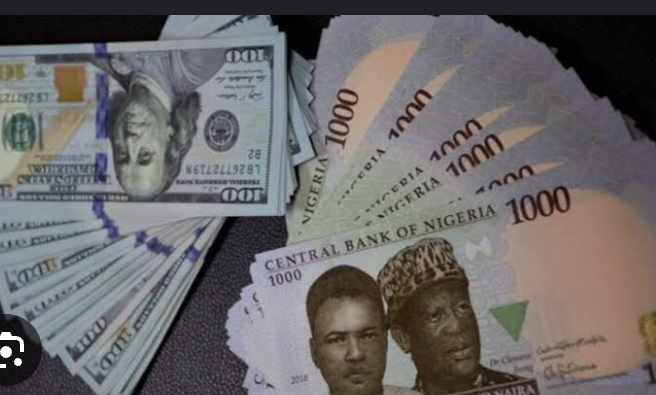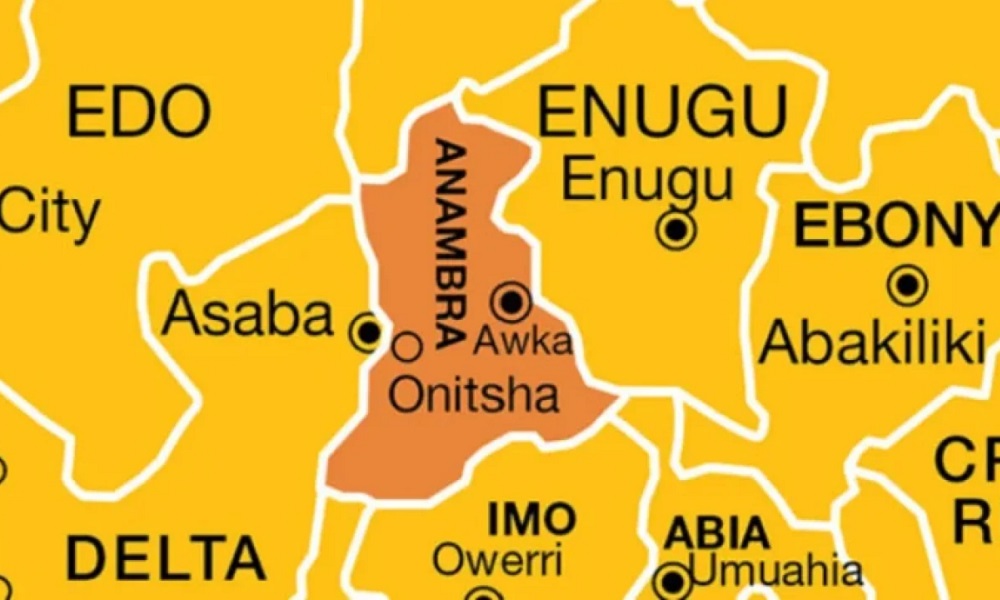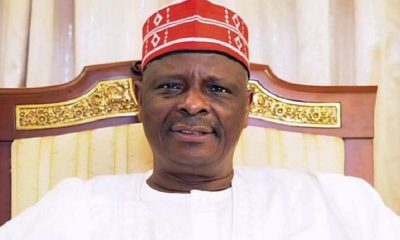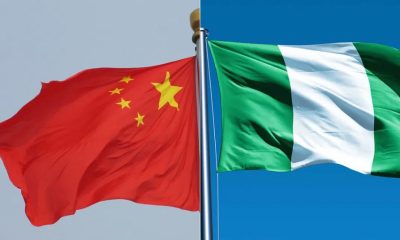News
SEE Dollar To Naira Exchange Rate Today August 22, 2024: Black Market And CBN Official Rates

By Kayode Sanni-Arewa
What is the Dollar to Naira Exchange rate at the black market also known as the parallel market (Aboki fx)? For many Nigerians, especially those engaged in foreign trade, travel, and investments, there is a nagging concern for the dollar-naira black market exchange rate.
Dollar to Naira Exchange rate DOLLAR TO NAIRA EXCHANGE RATE Dollar To Naira Exchange Rate Today Black Market and CBN official Exchange Markets: What is the Dollar to Naira Exchange rate at the black market also known as the parallel market (Aboki fx)? For many Nigerians, especially those engaged in foreign trade, travel, and investments, there is a nagging concern for the dollar-naira black market exchange rate. Advertisement 5 The black market rate for dollars to naira, parallel or Aboki FX as some know it will most of the time give different rates from the official CBN rates. The dollar to naira exchange rate at this point was still wiggling up and down. We will discuss in this article how the rate has moved up to this current dollar to naira exchange rate today, August 22, 2024, what drives the rate, and how all these affect the economy of Nigeria.
*Dollar to Naira Today Black Market.*
Buying Rate: N1600
Selling Rate: N1610
*Official CBN Rates*
Buying Rate: N1590
Selling Rate: N1595
*Understanding the Dollar to Naira Black Market for Forex*
What is the Black Market?
The black market
refers to unofficial exchange channels where currencies are traded without government regulation. This market often provides more competitive rates due to the high demand and limited supply of foreign currencies.
*Why Do People Use the Black Market?*
People turn to the black market due to:
*Favorable Rates:* Often higher than official rates. *Accessibility:* Easier to obtain foreign currency without stringent regulatory requirements.
*Factors Influencing Black Market Rates.*
*Economic Policies*
Government decisions on interest rates, inflation control, and forex regulations by the CBN directly affect the naira’s value. Policy adjustments aimed at stabilizing the naira impact the exchange rates.
*Supply and Demand*
The availability of foreign currency versus its demand significantly influences exchange rates. A shortage of foreign currency or high demand leads to naira depreciation.
*Political Stability*
Geopolitical events and internal political stability affect investor confidence. Political unrest or uncertainty can cause the naira to depreciate, while stability strengthens it.
*Global Economic Conditions*
Global market conditions, such as oil prices, international economic trends, and global inflation rates, influence the naira’s value. A significant drop in oil prices, for instance, negatively impacts Nigeria’s
economy.
*Comparing Dollar to Naira Official and Black Market Rates*
“Why the Disparity?*
Several factors contribute to the disparity:
*Supply and Demand:* Limited availability in the official market drives people to the black market.
*Regulatory Restrictions: CBN* imposes limits on forex availability, leading to higher black market rates.
*Economic Instability:* Fluctuations in oil prices and inflation prompt people to seek more favorable black market rates.
*Impact on the Economy*
High black market rates can:
*Inflation* : Increase costs for imported goods. Investment: Deter foreign *investment* due to economic instability. *Trade:* Benefit exporters while imposing higher costs on importers.
*Using the Parallel Market Safely*
*Tips for Transactions*
*Verify Rates:* Check reliable sources like Aboki FX for the latest rates.
*Reputable Dealers:* Engage with trusted Bureau De Change operators to avoid scams.
*Pounds and Euro to Naira Exchange Rates*
*Pounds to Naira (CBN Rates)*
Buying Rate: ₦2,073
Selling Rate: ₦2,074
*Euro to Naira (Black Market Rates)*
Buying Rate: ₦1,768
Selling Rate: ₦1,780
*Geegpay and Grey: Online Exchange Platforms*
*Geegpay Rates*
EUR (€): Buying at ₦1,690.03,
Selling at ₦1,695.55 GBP (£): Buying at ₦1,950, Selling at ₦1,965
USD ($): Buying at ₦1,504, Selling at ₦1,570
*Grey Rates*
EUR (€): Buying at ₦1,640.03, Selling at ₦1,719 GBP
(£): Buying at ₦1,902, Selling at ₦2,015
USD ($): Buying at ₦1,550, Selling at ₦1,570
*FAQs on Dollar to Naira Exchange Rate.*
How much is a dollar to naira today in the black market? The buying rate is N1601, and the selling rate is N1602 as of August 22, 2024.
*Why does the black market offer higher rates than the CBN?* The black market rates are driven by supply and demand dynamics, regulatory restrictions, and economic instability.
*Is it legal to trade forex in the black market* ? While the CBN discourages it, many engage in the black market due to the unavailability of sufficient forex through official channels.
*What are the risks of trading in the black market?* Among these risks are fluctuating rates, possible frauds, and illegality of such transactions.
*Can the CBN influence black market rates?* The CBN can only influence these rates through monetary policy, forex interventions, and regulatory measures; no direct control exists over such.
*How often do black market rates change?* Rates can change on a daily or even multiple times per day, depending on market conditions and economic news.
*Conclusion on Dollar to Naira Black Market Rate Today.*
The black market dollar-to-naira exchange rate represents an interaction of intricate components: economic factors, regulatory frameworks, and market dynamics.
This is real life to so many Nigerians; it also underlines the depth and scope of challenges and opportunities encountered within the Nigerian economic landscape.
The rates, coupled with their underpinning determinants, are quite instrumental in making decisions related to finance.
*Nigeria to Raise N190 Billion from Bond Market in August.*
The Federal Government of Nigeria, through the Debt Management Office (DMO), has announced its intention to raise N190 billion from the bond market in August 2024. This figure represents a notable 37% decrease from the N300 billion secured during the last bond offer earlier this year.
The bond auction is scheduled for August 22, 2024, and will include three re-openings, each with distinct maturity dates and interest rates. These options aim to attract a wide range of investors, offering them various investment choices. This initiative is part of the government’s broader strategy to manage its debt obligations and finance its budgetary needs effectively.
News
Anambra takes action against primary school over N5,000 prefect nomination fee

The Anambra State Government has slammed a one-month sanction on Blossom Fount School, Awka, for monetising student leadership by charging pupils N5,000 to contest for the position of head prefect.
The sanction, announced on Saturday by the state Commissioner for Education, Prof. Ngozi Chuma-Udeh follows reports that the school imposed the controversial fee on pupils in its primary section vying for leadership roles.
Describing the practice as “despicable,” Chuma-Udeh expressed outrage at what she called an attempt to commercialise student leadership and exploit the ambitions of young children.
She said, “Investigation is going on to know how the school is being run. It is an act of selling the psyche of the children to the highest bidder from the cradle, and it is not acceptable to this government.”
“The act of commercialising student leadership and exploiting children’s ambitions for financial gain is despicable. It amounts to selling the psyche of the children to the highest bidder from the cradle, and it is strongly condemned,” she added.
Chuma-Udeh stressed that Governor Chukwuma Soludo’s administration remains committed to upholding integrity and fairness within the education system, stating that such practices will not be tolerated.
According to reliable sources, the ministry’s investigation is still ongoing, and further sanctions may be imposed depending on the outcome. The goal, officials say, is to ensure accountability and deter similar actions in schools across the state.
News
NELFUND: ICPC deepens probe on loan fraud

The Independent Corrupt Practices and Other Related Offences Commission has continued its probe into the alleged discrepancies in the disbursement of funds under the Federal Government’s student loan scheme, Sunday PUNCH has learnt.
This comes amid repeated denials from the Nigerian Education Loan Fund that no money was missing in the student loan scheme.
Sources within the anti-graft agency told our correspondent that the investigation began after NELFUND sent a request, asking the agency to track the disbursed funds, after the National Orientation Agency raised the alarm that some schools were cheating the students on the loans disbursed to them.
One of the sources, an official of the agency who spoke anonymously because of the sensitivity of the matter, however, said no one had been indicted yet.
“We have just started the investigation. It was NELFUND that brought the matter to us to help them track where the money might have gone. We’ve not indicted anyone, but the allegation is still there,” the official said.
According to the source, preliminary findings revealed that N100bn was earmarked for the programme, but N28.8bn was disbursed to students.
Another source said further investigation had, however, shown that N203.8bn was received, out of which N44bn was disbursed.
“So far, we have not indicted anybody. They have disbursed N44bn. But when we get the recipients, we will find out if they did receive that amount. If they received the said amount, we will now find out where the discrepancy came from,” the senior official said.
The source urged Nigerians to remain patient and avoid insinuations, adding that the agency would disclose its findings once the investigation was complete.
“Nigerians should be patient with us and let us do our work. There is no need for insinuations. We are getting to the root of this. If the amount of N44bn has been received by the recipients, then there won’t be any problem. And if there are discrepancies, we will unearth them and disclose them to Nigerians,” the source said.
“If there are discrepancies, we will unearth them,” another source added.
NELFUND, on its part, has continued to dismiss the allegations of misappropriation as “entirely false and deeply damaging.”
In a statement issued on May 1, the Fund’s Director of Strategic Communications, Mrs. Oseyemi Oluwatuyi, stated that “the integrity of an institution established to deliver financial hope to millions of Nigerians must not be undermined by unverified claims.”
Managing Director of the Fund, Akintunde Sawyerr, also maintained this position during an appearance on Channels Television on May 4.
He confirmed that the Fund had actually received about N203bn, broken down as N10bn from the Ministry of Finance, N50bn from the EFCC’s proceeds of crime, and N143bn from TETFund.
He said, “The Nigerian Education Loan Fund has received about N203bn. I’ll break it down for you: N10bn from the Office of the Minister of Finance through the Office of the Accountant General, N50bn from the EFCC’s proceeds of crime, and N143bn from TETFund. So you can see already that the actual amount received is in excess of what’s even been said to have been received.
“Out of that, N54bn has been disbursed to date, while N30bn and N24bn had gone to institutions and for upkeep respectively. So there’s a pocket money side to this. That’s N54bn disbursed already in the space of about 11 and a half months. It’s in the Central Bank of Nigeria.”
Sawyerr reiterated this stance when he appeared before the House of Representatives Committee on Students Loan, Scholarship, and Higher Education on May 8, firmly stating that no funds were missing.
The controversy first gained traction in April following a National Orientation Agency investigation, which uncovered claims that some tertiary institutions, in collaboration with banks, were withholding student loan disbursements.
Efforts to reach ICPC’s spokesperson, Demola Bakare, proved abortive.
News
15 pipeline vandals convicted in Niger Delta, says Ribadu

No fewer than 15 pipeline vandals across the Niger Delta region have been convicted, while 100 others are being prosecuted.
The National Security Adviser, Nuhu Ribadu, disclosed this on Friday at a town hall meeting organised by Petroleum Infrastructure Nigeria Limited, a pipeline surveillance contractor, in Yenagoa, Bayelsa State.
Ribadu, who was represented by his Special Assistant on Energy, Security and Finance, Amakiri Harry-Young, said his office was working assiduously to protect crude oil infrastructure in the Niger Delta region.
He said those convicted were being held at the Port Harcourt Custodial Centre.
The NSA revealed that a special committee comprising investigative and prosecuting teams had been working round the clock to ensure that pipeline vandals and other offenders face justice.
According to him, the move followed concerns raised during a previous meeting about the arrest and quick release of oil vandals, which often led to further insecurity in the affected communities.
“The President is serious about the 2.5 million barrels, and we are doing everything necessary to reach that goal,” he said.
He added that success would depend on the collective efforts of all stakeholders involved, as the Federal Government was taking strong action against pipeline vandals who threatened national assets and local communities.
In his opening address, the PINL Consultant on Community Relations, Dr Akpos Mezeh, said the firm had recorded major successes in safeguarding the Trans-Niger Pipeline through close collaboration with host communities, security agencies, and other key stakeholders.
Mezeh also stated that PINL had helped reduce crude oil theft and pipeline vandalism to near-zero infractions on the pipeline by investing in community needs, resolving disputes, and restoring the environment.
He pointed out that PINL had also improved crude oil production and restored greater investor confidence, thereby contributing to an increase in national revenue.
The President of the Ijaw National Congress, Prof Benjamin Okaba, stressed that Ijaw communities had always supported Nigeria’s unity and economic stability and also taken the lead in the management of pipelines through companies like PINL.
Okaba called on communities to fully support PINL’s operations, stressing that any success recorded in protecting pipelines was also a credit to the Ijaw people.
-

 News15 hours ago
News15 hours agoTrouble brewing as Trump’s supporters move against Pope Leo, give reason
-

 News17 hours ago
News17 hours agoHow doctor stole one of my twins during birth, Abuja housewife narrates nasty experience
-

 News17 hours ago
News17 hours agoNaira Rebounces Against Dollar – Saturday, May 10, 2025
-

 News22 hours ago
News22 hours agoDefections: It’s a massive betrayal against NNPP -Kwankwaso cries out
-

 News15 hours ago
News15 hours agoChina Responds to AFN Claims Over Visa Delays for World Relays in Guangzhou
-

 Education22 hours ago
Education22 hours agoWhy JAMB is withholding 39,834 UTME results
-

 News15 hours ago
News15 hours agoReflections of Hon. EJ Agbonayima on Nation Building
-

 News15 hours ago
News15 hours agoDigital Shift in National Assembly No Longer Optional – CNA Ogunlana






